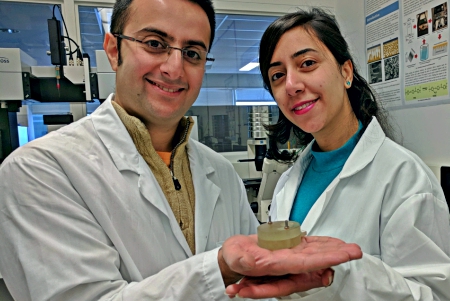
WATERWORKS: (L-R) Amirreza Sohrabi and Parmiss Mojir Shaibani launched Roshan Water Solutions early in 2017, developing a prototype for a handheld water testing sensor.
(EDMONTON) Small-town utility officers and farmers across Canada never take clean water for granted. But the current process for testing municipal and rural water is cumbersome and inefficient. First, they must collect the samples, then send them to labs hours away in the city.
"And then the processing itself often takes two days," says Parmiss Mojir Shaibani, a post-doctoral fellow in the University of Alberta's Department of Mechanical Engineering. She says that kind of delay poses risks.
"What if the water is unhealthy to drink?" she asks. "Over that period of time, people and animals drinking it could become sick."
Mojir Shaibani-who spent much of her U of A materials engineering PhD researching clean water testing technology-cares about ensuring clean drinking water for people across Canada and around the world.
She and her husband Amirreza Sohrabi, who also spent most of his PhD in materials engineering at the U of A studying treatment-focused clean water solutions, combined her expertise in water testing and his in water treatment to address the problem. The pair, who moved from Iran to Edmonton in 2010 for graduate studies, decided midway through third year to start a business.
They launched Roshan Water Solutions early in 2017, with a focus on its first product, a handheld water testing sensor.
"Roshan's water testing technology fills a huge need," says Noreen Hoskins, director of eHUB, the U of A's entrepreneurship centre. "The handheld sensor tests water on site for E. coli, eliminating the risk of human error and the need to transport samples." The device will also lower costs to users.
Mojir Shaibani says there's nothing quite like the sensor available in Canada. It can identify the presence of E. coli in a small water sample by detecting changes in the pH balance. In an hour, the device indicates whether water samples are safe or unsafe.
"We haven't reinvented the wheel," says Mojir Shaibani. Rather, he says they have combined nanotechnology with existing technology to improve the process.
Finding a lab was a top priority for the new company. "But we knew that rent for a lab would cost $3,000 a month. We didn't have the money," said Sohrabi. So they hunted around and found a unique funding opportunity with Mitacs-a national research organization that manages and funds training research programs. It's piloting a program called Entrepreneur Accelerate that supports students who want to launch a business.
Sohrabi and Mojir Shaibani have been hired as post-doctoral research fellows for two years in the U of A's Advanced Water Research Lab, supervised by mechanical engineering assistant professor Mohtada Sadrzadeh. Mitacs pays for half of their stipend, the couple pays for the other half, and the U of A supports their transition from academic endeavours into the business world by supplying lab infrastructure. It makes for long days, but they stay motivated by focusing on the long-term goal.
"We'd like to have a full-scale operation with 30 employees in 10 years," says Sohrabi.
"Five years!" interrupts Mojir Shaibani.
Once their prototype-an easy-to-use device-is complete, their initial target market is water testing agencies and engineers in rural communities. Another market is individual rural businesses, such as farmers and homeowners who live on well systems. But the benefits lie beyond business.
"Starting this business isn't just about making money," Mojir Shaibani says. "We want to make a difference in people's lives, beginning with improving the water safety management here in Canada."